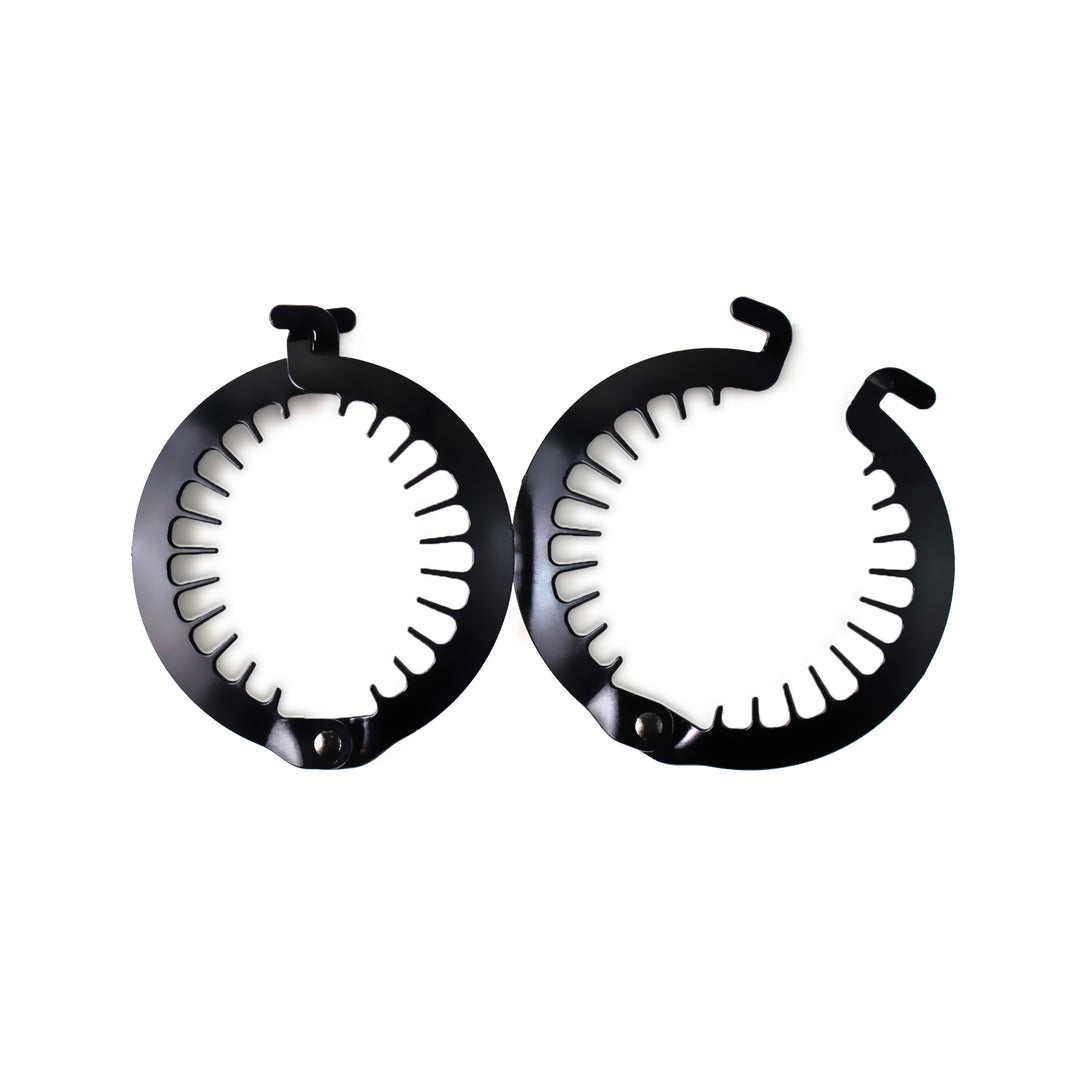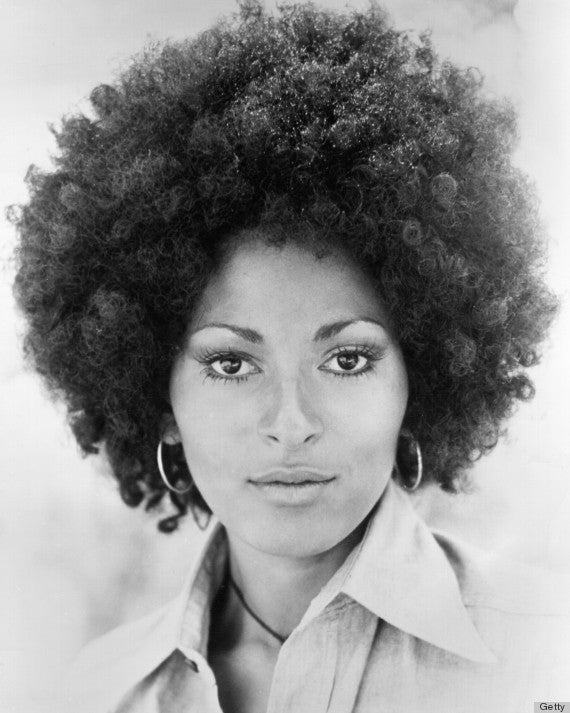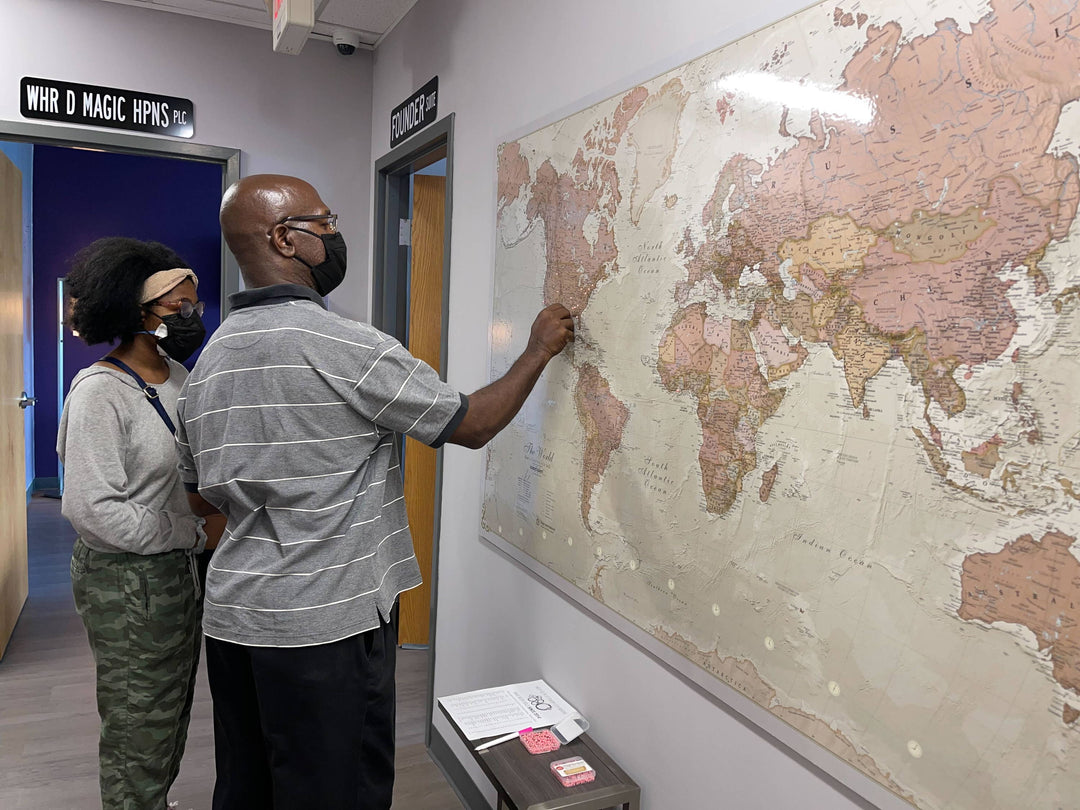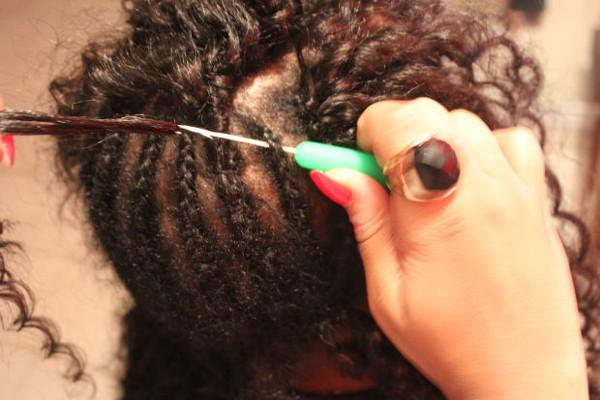Growing up and attending an elementary and middle school where I was the only Black girl and the only person of color period, I was self-conscious about three things: my big lips, my big butt, and my big hair... not knowing that one day when I grew up that I would be praising Jesus for His ample gifts as a full-grown woman. None of my white girlfriends had these three and they were the subject of many a conversation. Granted, my hair at the time was relaxed and only “big” for a random picture day when my mom finally let me wear it out, but it was still an issue. I remember one time in particular when I was in third grade and the lunchtime monitors (who were older girls from the middle school classes) laughed at me and whispered about how “crazy it was,” prompting me to cry and tell my teacher when she returned, who (thankfully) set them straight.

By the time I started high school in ‘95, I was cool with embracing my curves, but definitely not with my curls... not that I knew what they looked like. As a 5-year old, my hair was hot-combed. As a first-grader, my hair was chemically relaxed. As I grew up, if the hair along my edges or my crown would get “nappy,” I was conditioned to immediately get ready for (or even request with urgency) my trip to the salon, which happened every six to eight weeks like clockwork. Family, friends, strangers all heaped praise upon my hair as it grew longer and straighter and I internalized that praise as my hair being beautiful... as me being beautiful.
When I got to college in the fall of ’99, relaxers were just part of my “hair care” regimen. I didn’t give it another thought. It was just something I did because what else what I was going to do? I would cut it, I would curl it, I would pin it, I would braid it, but I would always, always have it straightened no matter the style. Somewhere around my junior or senior year though, I saw a picture of Goapele after discovering her debut song “Closer” and fell in love with her style and beauty. I desperately wanted to copy pretty much everything about her, but now career was holding me back... or rather the career I wanted to embark upon.
I was interning at a TV station and planned on becoming a TV Reporter/Anchor. I had never seen natural hair on the news, much less locs, so I didn’t want to attempt to take the “risk.” I kept my hair straightened, landed my first full-time on-air job a month before I graduated even, and once again accepted that my hair needed to be “a certain way” for me to hold my position. Eventually, I started experimenting with triple-barreled curling irons to give my hair body, but it didn't dawn on me that I would actually have body if I stopped sucking the life out of it with relaxers.
I don’t know what it was, but some time in 2005, I just stopped. I couldn’t take the smell of the relaxer anymore, the straight hair bored me to tears because I looked like everyone else, and the thought of a chemical burn on my scalp could not be justified with the “no pain, no gain” mentality of my youth. Not only was I sick of relaxers, but I was also disgusted with myself for putting my health in harm's way and for subscribing to Caucasian beauty esthetics unquestioningly and at the expense of my own personal beauty — a beauty I hadn’t seen since I was a toddler. I knew too much now — knew the health risks, knew the subliminal cultural cues I was conditioned to that taught me my beauty wasn’t beautiful, and honestly, was just tired of being a bland version of myself.
This epiphany came two weeks after I had just cut my hair in that old look Rihanna used to rock where it was long bangs in the front and cut short in the back. I told my stylist the next time I saw her that I didn’t want a touch-up on my relaxer and she sort of freaked out because “I should have told her before she did the cut,” but she promised that she could transition me to natural, saying that we could do a straw-set every week on the short ‘do until it grew out for a wash n’ go. That actually worked really well... for a while.

Once it grew and I began rocking a wash n’ go, my stylist became more and more frustrated. Contrary to her saying that she could handle natural hair, her insistence that we just “touch the roots quickly with a texturizer” showed me otherwise. She did that twice on my now virgin tresses and immediately my hair was taken from its soft, natural curls to a processed version. I stopped going to her and decided to figure it out on my own.
It was a precarious situation to be in, transitioning on-air. After all, I was a TV Reporter/Anchor and, in this business, your look is dictated by your employer. I told my News Director that I planned on cutting it before I made that move, which he was cool with, but I never mentioned the transition to natural... just all of a sudden walked into work with a straw-set. He made a joke like, “Oh, so we are just going to switch our hair every week?” to which I replied something like, “Nope. I think this is it.” And he laughed, saying he liked it - thank goodness - and that was it. But what if he didn’t? What if the idea of curly hair or natural hair on air scared him? What if viewers made it an issue and called in? These were all fears that I had - fears that many on-air Women of Color still have 13 years later! It’s scary to think that one boss could have that much power to stop a woman from embracing the hair that naturally comes out of her scalp... a force that prevents a woman from fully loving her own self for fear of it negatively impacting her career.

I’ll admit that my move was a power play, though. While I didn’t have the agency and the following to rock my hair natural early in my career right out of school, a few years into my career and back in a market where I knew the community loved me, I calculated the “risks” from the past and knew now was the time to make the move and try.
In addition to working in TV at the time, I also hosted the # 1-morning radio show in the market which happened to be owned and operated by a prominent Black family and had been the voice of the community for 30+ years at that point. I was so through with being an inauthentic version of myself and so committed to going natural that I knew that should I encounter any kickback from my station about my natural hair, that I could go on the radio the next morning and tell my listeners about it and that they would have my back with phone calls and emails to the station in a heartbeat. I was a family with my listeners and you don’t mess with family. Fortunately for me though, that never came to pass because there was never a need. Even by the time my hair had fully grown out and was essentially a curly ‘fro at the desk, it was never an issue... not with work, not with viewers, not with anyone.


I left the business for a while, returning just last year as a Lifestyle TV Host and yes, my hair is still big and natural and it will always be. I blow it out from time to time, but I refuse to wear my hair straight on air. It’s important for me that young black girls and Women of Color, in general, see natural hair on air without the need to conform or the fear of having to conform. The fact that this is still a topic of conversation more than a dozen years after I first did this on-air honestly makes me sad, but I understand why. Our beauty as black women - our “extraness” - is hard to subdue and why should we? Why should we diminish what makes us stand out just because it makes us stand out? It is ours simply by our existence. We have been told and sold so many lies about our looks, I’ve found that unlearning them can be a process that many women either don’t have the patience for or don’t want to start because it uncovers too many truths about their own feelings of beauty and race and even internalized racism or self-hate. In the black community, “hair” isn’t just simply hair. There are layers and layers before you get to the root of it all.

I am so happy and encouraged by all the naturalistas I see on-air now because when I transitioned, that was definitely not the case. I am excited that at this rate, natural hair on-air is what my young daughter will always know and that her mommy was one of the women who decided that enough was enough. I am thankful for products like PuffCuff that make looking fly on-air easy, even when humidity threatens to make me run out and get a tapered cut again on a whim. And I am glad for blogs like this and forums where we, as not just Black women or women for color, but women of TEXTURE, can gather virtually, share our experiences, provide support and understanding, and be a resource for others who are breaking free to be their authentic, healthier selves. Here’s to you, to me, to US — beautifully authentic and bold in our commitment to be so.
To follow Elsa M. and Eden Hansom please click links below:
@IamElsaM
@TheEdenAndElsaShow
Twitter
YouTube
Facebook
One more thing, just after I finished up preparing this blog post this very same subject came up on my Facebook feed. How timely, right?!?! A reporter in a different market, Corallys Ortiz, wore her curly natural hair on-air. She received a horrible call from a viewer, who had the gall to use the N-word, in response to her decision. You have to read how this beautiful a meteorologist and TV reporter at WBBJ 7 in Jackson, TN responded and the support she received from her non-ignorant viewers.
The fact that the professionalism of women of African descent is called into question because they chose not to alter the texture of the hair that's growing directly out of their scalp or disguise it is despicable and downright disrespectful. Girl, represent! Be true to you! We ain't mad at ya! (This paragraph was authored by Ceata Lash, Founder of PuffCuff)














Elsa is one of my dear friends!! She was wearing her natural curls when we first met more than 10 years ago and she has been awesome and helpful as I also made the transition on air from relaxer to natural this past year. So proud of her!!
Leave a comment